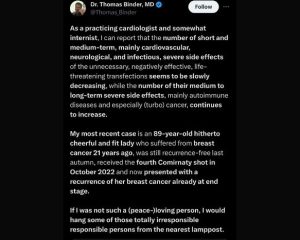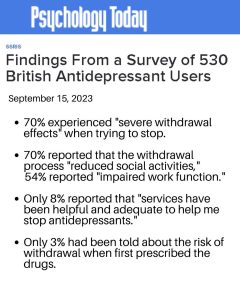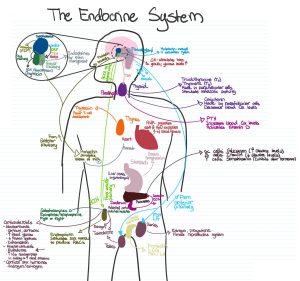One commenter nailed it, “By far one of the best expert analysis of not just the Hamas-Israel conflict but of geopolitics across a few continents. Plus some lessons about diplomacy, culture and history.”
Trickle Truth

Dr Thomas Binder Tells It

The Greatest Evil

This is one smart girl!
Coming Off Antidepressants

An article published in Psychology Today worth reading, by John Read PhD.
How To Freeze Corn!

From the Facebook group Canning, Freezing, Dehydrating, Food Preserving and Homesteading
Saw some folks asking about freezing corn on the cob. Here is the way I’ve been doing it for many years, after a long time old farmer told me how to get the best tasting frozen corn.
Peel away a few of the outer layers of shuck skins. Trim each end of the cob.
DO NOT blanch the corn. Put the corn straight into freezer bags or vacuum seal them, and freeze. When you’re ready to eat it, put it under running water and remove the shucks and silks. Then boil it for approx 15 minutes. You can also steam it, put on the grill in the shuck wrapped in aluminum foil or even microwave it. Perfect corn on the cob!!! It will taste like fresh picked. I’ve been doing it this way for many years and its never been soggy or gummy. Just always cook it while frozen.
Hell Is Empty

I read this and thought, “The wording might not be true but the sentiment is valid.” then learned it is a quote from Shakespeare!
Not a lot has altered in a few hundred years hey?
Glyphosate Myths

Give Life

The Endocrine System and Disruptors

The endocrine system consists of glands which secrete or release hormones into your bloodstream. These hormones signal other parts of the body (organs like the heart and lungs, muscles, the digestive system) to respond to the receipt of the hormone by starting, accelerating, decelerating, stopping or altering aspects of their functionality.
For instance when confronted with a survival threat your adrenal glands release adrenaline. When adrenaline is released, it affects the body in six key ways:
• It causes air passages to widen (dilate) to provide muscles with the oxygen they need to either fight or flee danger.
• It causes blood vessels to narrow (contract) to redirect blood flow to major muscle groups, including the heart and lungs.
• It causes the heart rate to speed up and the heart to contract more forcefully so that more oxygen is delivered to muscles and tissues.
• It causes the liver to release blood sugar (glucose), which provides the body with energy.
• It causes the pupils of your eyes to dilate (known as stress-induced mydriasis) so that you see more clearly, even in the dark.
• It reduces the perception of pain (known as stress-induced analgesia) so that you can continue fighting or fleeing even if you are injured.
Adrenaline is not only released when there is actual danger but also during moments of emotional stress. This may include taking a test, watching a scary movie, speaking in public, going out on a date, or doing an extreme sport like skydiving.
Various toxins, external and ingested, can affect the operation of the endocrine system.

